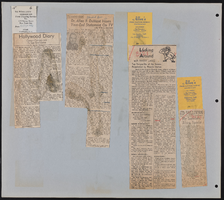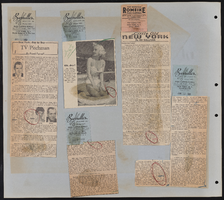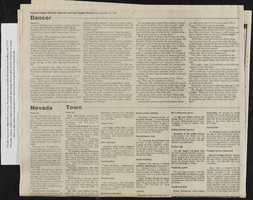Search the Special Collections and Archives Portal
Search Results

Lisa Song Sutton oral history interview: transcript
Date
Archival Collection
Description
Oral history interview with Lisa Song Sutton conducted by Cecilia Winchell, Vanessa Concepcion, and Stefani Evans on November 19, 2021 for Reflections: The Las Vegas Asian American and Pacific Islander Oral History Project. Lisa shares her personal history and childhood memories moving from Seoul, South Korea to Sierra Vista, Arizona at the age of five. She discusses her educational and professional pursuits in business litigation, bankruptcy law, entrepreneurship, modeling, and her time in the pageant circuit winning Miss Vegas and Miss Nevada in 2013. Lisa also talks about her activism and community engagement efforts to empower women within Las Vegas. She concludes her interview with insight into her Korean heritage, traditional celebrations, and religion.
Text

"Talking Stories: A Panel of the City of Las Vegas AAPI Committee" panel discussion: transcript
Date
Archival Collection
Description
This Asian American and Pacific Islander Day panel discussion, "Talking Stories: A Panel of the City of Las Vegas AAPI Committee," features six panelists and was moderated by Allycia B. Murphy, Deputy City Attorney, Office of the City Attorney, Criminal Division. Panelists include Cynthia Leung, Chief Judge for Las Vegas Municipal Court; Jennifer Rabanes, Recreation Coordinator at Centennial Hills Active Adult Center; Patricia Cabrera, Enterprise Records Officer, City Clerk's office; Joey Boquecosa, Equipment Operator, Public Works Department; Natasha Shahani, Senior Public Information Officer; and Gai Phanalasy, Multimedia Production Specialist. The panel was held at Las Vegas City Hall on May 11, 2023, following Las Vegas Mayor Carolyn Goodman's declaration of May 11, 2023, as "Asian American and Pacific Islander Day." Anticipating the proclamation, the City's AAPI employees formed the City of Las Vegas AAPI Committee to organize the City's first AAPI Appreciation Day at City Hall. The Committee invited several local AAPI performers, organizations, and social, cultural, and advocacy groups to celebrate, honor, and recognize the City's AAPI employees across all departments.
Text
Jeff Reiman (The Broadband Group) oral history interview conducted by Kelliann Beavers and Elia Del Carmen Solano-Patricio: transcript
Date
Archival Collection
Description
From the Lincy Institute "Perspectives from the COVID-19 Pandemic" Oral History Project (MS-01178) -- Business interviews file.
Text

Transcript of interview with Oscar Goodman by Claytee D. White November 10, 2014
Date
Archival Collection
Description
Oscar Baylin Goodman (1939- ) is the former mayor of the city of Las Vegas, Nevada, serving 12 years until 2011, when he swore in his wife of over 50 years, Carolyn Goodman. Oscar Goodman is the official ambassador of Las Vegas, and the chairman of the Las Vegas Convention and Visitors Authority (LVCVA) Host Committee. He is also known as one of the best criminal defense attorneys in the United States, and spent 35 years defending alleged Mob figures such as Meyer Lansky, Frank Rosenthal, and Anthony Spilotro. Goodman is the primary visionary and a member of the board of directors of The Mob Museum in downtown Las Vegas, which opened in 2012. Goodman was born June 26, 1939 in Philadelphia, Pennsylvania. He earned his undergraduate degree from Haverford College in 1961 and his law degree from the University of Pennsylvania Law School in 1964. That same year he moved to Las Vegas and in 1965 he was admitted to the Nevada State Bar. He served as Clark County?s chief deputy public defender from 1966 to 1967. Goodman was elected as mayor of Las Vegas for the first time in 1999. During his three terms (the legal limit), he contributed to the economic and cultural development of the downtown area by supporting projects such as the arts district and Union Park, a high-rise residential and business project he helped to secure 61 acres of land for. He helped to begin what he called the ?Manhattanization? of downtown, which included the construction of taller buildings for better use of the area?s prime real estate. In this interview, Goodman discusses the role of Judaism in his life, from childhood to adulthood to parenting his own four children. He touches on his involvement with Temple Beth Sholom, including serving as its president, as well as in local development projects like the Lou Ruvo Cleveland Clinic Brain Health Center, Smith Center for the Performing Arts, and Mob Museum. In addition, Goodman discusses the impact of Jewish residents on the city and its development, and mentions leaders in the gaming industry, legal profession and in politics.
Text

Transcript of interview with Renee Diamond by Barbara Tabach, November 20, 2014
Date
Archival Collection
Description
In this interview, Renee Diamond discusses coming to Las Vegas via Los Angeles, with her husband and children in the 1970s and getting involved in politics. She talks about her husband, Leo, and his business selling vinyl records in L.A., and her work in a doctor's office. Once in Las Vegas, the Diamonds joined Temple Beth Sholom and later Congregation Ner Tamid. Renee talks about her involvement in the political arena in southern Nevada, including the League of Women Voters.
Community activism and social justice rank high in the legacy of Renee Diamond. She often refers to herself as one of the last of the generation without college degrees that could make a difference in the politics of the state. When Renee, her husband Leo Diamond moved their family to Las Vegas from southern California, the energetic advocate Renee quickly plugged into the community. The word "No" was not part of her vocabulary. Among the many Jewish and secular activities the she engaged in were: the editorial board of the Jewish Reporter newspaper; Hadassah; Anti-Defamation League; Red Cross Board; State Museum Board to name a few. She remains a vibrant Democratic Party leader and served one term on the Nevada Assembly in 1989. She was on the front lines as a fierce and active supporter of Welfare Rights, Fair Housing and the Equal Rights Amendment. It is a life that included working alongside illustrious women and men of Southern Nevada history. A list that includes: Harriet Trudell, Ruby Duncan, Myrna Williams and Dorothy Eisenberg and many more mentioned here. Meanwhile she raised four children and enjoyed a loving 43-year marriage with Leo (aka "Uncle Leo") whose career included the popular Bingo Palace, Slots-A-Fun and Stations Casinos. During this oral history interview she recalls the Las Vegas that she moved to in 1972 and reflects on what attracted people here, ways to be part of the Jewish life which might even include a bowling league and how involvement in raising social awareness was a worthy investment of ones' time. This is a look at a woman who made a difference.
Text
Stuart and Flora Mason Photographs
Identifier
Abstract
The Stuart and Flora Mason Photographs (1940-1999) contain photographs of hotels, casinos, and other buildings constructed by Taylor International Corporation, which was owned by the Mason Family. The photographs depict the Aladdin, Venetian, Tropicana, Riviera, MGM Grand, and International hotels and casinos in Las Vegas, Nevada. The photographs also depict buildings in Miami and Coral Gables, Florida, and San Juan, Puerto Rico.
Archival Collection




